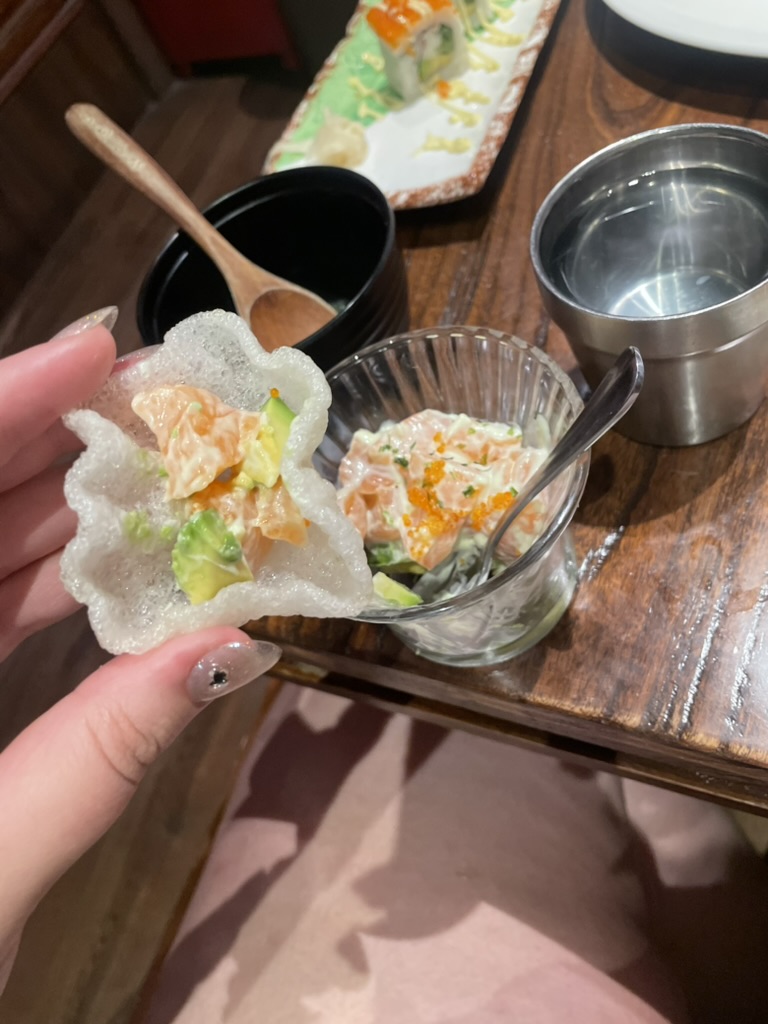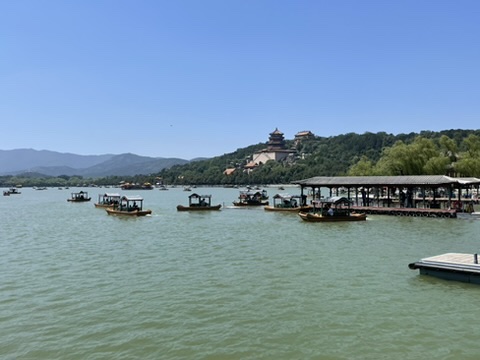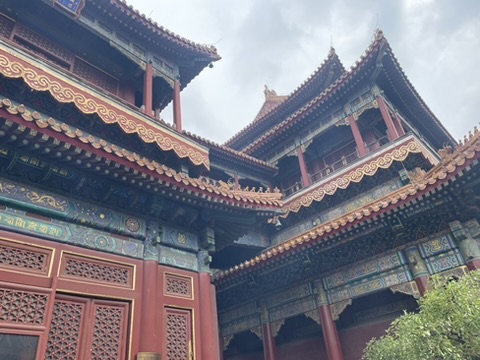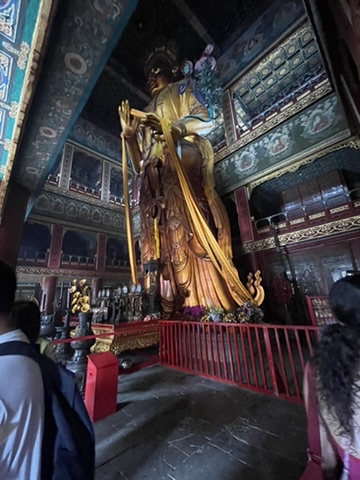Week Nine
This week in Beijing was hot – like strike you in the face the moment you leave for work in the morning hot. Warren, the owner of the apartment, tells me this two month period of July and August is the hottest part of the year and the most humid. We also see the most rainstorms during this time period, which is what we experienced Wednesday afternoon when the firm let us go early in order to avoid any dangers from an oncoming storm.
At work, things have been slowing down. Many of the interns plan to end their internships either this week or next, myself included. As this is my second-to-last week, there wasn’t as much work to go around but I still reached out to Ms. Li asking for other consultations to keep me busy. She sent over some consults to be translated by one of the other interns and we planned to have a meeting Thursday afternoon to discuss the answer for both a previous consultation I had worked on and this more recent one. The new consultation included a real example of a consultation request Ms. Li had received regarding a chronically ill child whose parents had all but given up on the child and wished to discontinue life-saving treatment despite a hopeful prognosis (in just a few words to maintain anonymity). Initially, the scenario presented me with both a legal and moral quandary. My first reaction was immediate disdain for the parents who wished to abandon the child, which translated into my research. First, I searched for relevant criminal codes on child abandonment and the punishment for parents who reject their children simply because it becomes too inconvenient or difficult to continue. However, at least in Virginia, dropping the child off at a 24-hour hospital where they may receive care presents an affirmative defense for the parents and they will likely not be convicted of criminal abandonment. However, this defense does not apply to a civil claim. In examining that, I noted a situation like this would likely result in the parents losing temporary if not permanent parental rights and the child would enter state custody.
 Thursday afternoon, we all gathered in one of the conference rooms in ZhiCheng and began our discussion. Like our last meeting, both sides had plenty of questions for the other regarding their legal systems and how one would handle these particular sets of facts. For the custody question, Ms. Li discussed first and foremost the hospital social worker would have a duty to assess the child for the child’s likelihood of survival and medical needs. Then, the social worker, with the assistance of an attorney, would explain the ramifications if the parents left the child at the hospital. This action could lead to police involvement for child abandonment or other serious criminal charges. Eventually, the social worker determined the mother was suffering from postpartum depression while the father and grandmother were concerned about the child’s continuing medical status, worried that the child would be chronically ill for the rest of their life. First, the social worker recommended the mother receive counseling for her condition and the social worker also set up several meetings between the grandmother and parents with their child’s doctors to assure them the current medical care was only necessary because the child was born pre-maturely and more time in the hospital would lead to the child eventually living a full, healthy life. During the meeting, we also discussed Safe Haven laws in the U.S. to which Ms. Li and the Chinese interns mentioned there were no such policies in China anymore. Uncertified reports showed that Chinese families mostly used the system to drop off children with disabilities, so the policy was discontinued. I mentioned, trying to be delicate, that Lily and I had noticed there were not many children with physical disabilities (such as wheelchairs or walkers) in Beijing. Jiang replied that there were not many financial protections for families with children with disabilities here in China, and these families often have to pay exorbitant medical expenses out of pocket to pay for their care.
Thursday afternoon, we all gathered in one of the conference rooms in ZhiCheng and began our discussion. Like our last meeting, both sides had plenty of questions for the other regarding their legal systems and how one would handle these particular sets of facts. For the custody question, Ms. Li discussed first and foremost the hospital social worker would have a duty to assess the child for the child’s likelihood of survival and medical needs. Then, the social worker, with the assistance of an attorney, would explain the ramifications if the parents left the child at the hospital. This action could lead to police involvement for child abandonment or other serious criminal charges. Eventually, the social worker determined the mother was suffering from postpartum depression while the father and grandmother were concerned about the child’s continuing medical status, worried that the child would be chronically ill for the rest of their life. First, the social worker recommended the mother receive counseling for her condition and the social worker also set up several meetings between the grandmother and parents with their child’s doctors to assure them the current medical care was only necessary because the child was born pre-maturely and more time in the hospital would lead to the child eventually living a full, healthy life. During the meeting, we also discussed Safe Haven laws in the U.S. to which Ms. Li and the Chinese interns mentioned there were no such policies in China anymore. Uncertified reports showed that Chinese families mostly used the system to drop off children with disabilities, so the policy was discontinued. I mentioned, trying to be delicate, that Lily and I had noticed there were not many children with physical disabilities (such as wheelchairs or walkers) in Beijing. Jiang replied that there were not many financial protections for families with children with disabilities here in China, and these families often have to pay exorbitant medical expenses out of pocket to pay for their care.
These kinds of meetings are always so interesting to be involved in. Even though there is a language barrier, we can communicate complex legal ideas and discuss concepts that seem so familiar to us in America but have a completely different story here in China.
 As this past weekend was my last free weekend in Beijing, I decided to spend it doing activities I had not yet had a chance to do, including the Summer Palace, Lama Temple, and Hongqiao Market. Like the rest of the week, the weekend was hot hot hot. And this resulted in, perhaps, a jaded experience at the Summer Palace. As the children are officially on summer holiday, the Palace was extremely crowded. When you first enter the Northern entrance, you’re greeted by a traditional Chinese gate with three entrances, ornately decorated with reds and blues and a traditional curved roof. You’re also greeted with what appears to be an infinite number of stairs. As I climbed the stairs, I thought to myself, there’s gotta be a different way to do this. Lifting myself onto the rocky incline and ducking my head into the cave entrances, I thought, there’s no way an Emperor would come this route. I made it to the peak of the mountain before going down again. Along with the palace, there is a massive lake that previous Emperors and Empresses would take government officials and foreign diplomats on to entertain them. It wasn’t until I was around the bend of the lake that I realized the Summer Palace was behind me and I had missed the line of stairs leading up to the main Palace. Dodging the parade of umbrellas (it is very common in Asian countries for the women to carry umbrellas during sunny days to prevent tanning), I sighed in exasperation. I wasn’t turning back now. I explored the grounds a little bit more before deciding to head home that afternoon just as the day was reaching its hottest.
As this past weekend was my last free weekend in Beijing, I decided to spend it doing activities I had not yet had a chance to do, including the Summer Palace, Lama Temple, and Hongqiao Market. Like the rest of the week, the weekend was hot hot hot. And this resulted in, perhaps, a jaded experience at the Summer Palace. As the children are officially on summer holiday, the Palace was extremely crowded. When you first enter the Northern entrance, you’re greeted by a traditional Chinese gate with three entrances, ornately decorated with reds and blues and a traditional curved roof. You’re also greeted with what appears to be an infinite number of stairs. As I climbed the stairs, I thought to myself, there’s gotta be a different way to do this. Lifting myself onto the rocky incline and ducking my head into the cave entrances, I thought, there’s no way an Emperor would come this route. I made it to the peak of the mountain before going down again. Along with the palace, there is a massive lake that previous Emperors and Empresses would take government officials and foreign diplomats on to entertain them. It wasn’t until I was around the bend of the lake that I realized the Summer Palace was behind me and I had missed the line of stairs leading up to the main Palace. Dodging the parade of umbrellas (it is very common in Asian countries for the women to carry umbrellas during sunny days to prevent tanning), I sighed in exasperation. I wasn’t turning back now. I explored the grounds a little bit more before deciding to head home that afternoon just as the day was reaching its hottest.
 The next day, I continued my stint as a tourist, heading to the Lama Temple. This is the one of the largest Tibetan Buddhist temples in Beijing, and it is completely open to the public. Located in the Dongcheng District, the metro ride to the Temple was only half of what it was to the Summer Palace. Again, because the children are on summer holiday, the touristy sites like this are extremely crowded. An interesting fact about China tourism is that 98% of the tourists in Beijing are from other parts of China. So, me going to tourist locations like this often draw just as many stares as the surrounding buildings. I try to ignore them as I pass through the buildings, avoiding the praying, incense wielding individuals. As I pass through the many buildings, one of which hosted a wooden statue of the Buddha Maitreya. At sixty feet tall, it is recorded as the world’s tallest Buddha Maitreya wooden statue in the Guinness World Record Book.
The next day, I continued my stint as a tourist, heading to the Lama Temple. This is the one of the largest Tibetan Buddhist temples in Beijing, and it is completely open to the public. Located in the Dongcheng District, the metro ride to the Temple was only half of what it was to the Summer Palace. Again, because the children are on summer holiday, the touristy sites like this are extremely crowded. An interesting fact about China tourism is that 98% of the tourists in Beijing are from other parts of China. So, me going to tourist locations like this often draw just as many stares as the surrounding buildings. I try to ignore them as I pass through the buildings, avoiding the praying, incense wielding individuals. As I pass through the many buildings, one of which hosted a wooden statue of the Buddha Maitreya. At sixty feet tall, it is recorded as the world’s tallest Buddha Maitreya wooden statue in the Guinness World Record Book.

After passing through all of the buildings, I stopped for coffee before heading to my next stop – the Hongqiao Pearl Market. This is Beijing and China’s largest market for pearls and is visited by a million visitors a year. The market is more like a mall with six floors, each boasting something different. The bottom floor is a food mall with a wide variety of options. The ground floor sold mostly electronics as well as clothes and random trinkets. On the second floor, there were bags and suitcases and Chinese goods. In the background, you can hear the haggling of prices, which I, of course, partook in. On the third floor and up was the pearl market – the higher you go, the more quality and expensive the items are. Safe to say, me and my student budget self didn’t go above the fourth floor. I learned that seawater pearls are typically more valuable than freshwater pearls. This is because saltwater pearls have a stronger luster and shine, are rarer, and are more difficult to farm. Nonetheless, despite the seller’s badgering, I walked away from the 1,700 RMB ($235) pearl necklace I had been eyeing. After spending way too much (as always), I headed back down to the food market where I indulged in my first Indian meal since being in China. Indian food is one of my favorites so having my comfort Chicken Tikka Masala reminded me a little bit of home.
Every day we get closer to returning to the U.S. While I am very thankful for my time here and have found it to be an invaluable experience, I am ready to return to the United States – even if my bank account isn’t.